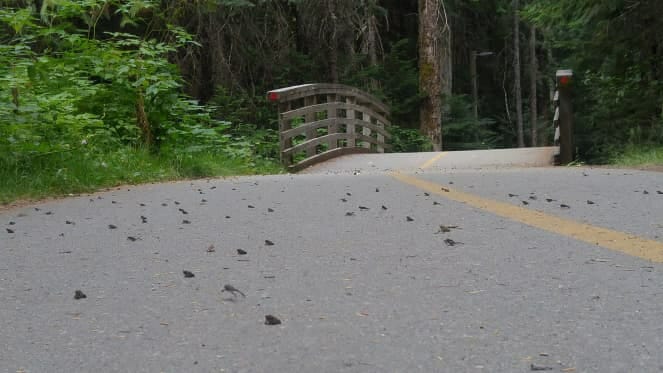Visitors heading to Lost Lake Park will notice some big changes over the next few weeks as tens of thousands of tiny Western “toadlets” make the great migration from the shores of Lost Lake into the surrounding forest. Western Toads are a species of conservation concern meaning they are vulnerable to changes in their environment. To help protect this species during its most vulnerable life stage the RMOW will be closing portions of Lost Lake Park during the migration.
Beginning on Sunday, July 18, 2021 the Lost Lake access road and parking lot closed to all vehicle and pedestrian traffic. Visitors are encouraged to walk or bike into Lost Lake Park via the Valley Trail or Lost Lake Loop Trail to view the migration and learn more about Western Toads from onsite Naturalists. The Whistler Bike Valet will be offering free, secure, bicycle parking at Lost Lake every Friday through Sunday during the summer months.
During the access road closure, the free Lost Lake Shuttle will continue to run with minor changes, visitors will now be dropped off at the entrance to Lost Lake Park on Blackcomb Way. From there, visitors can walk 400 meters down the Valley Trail to reach the park lawns and beach.
At this time, the Lost Lake beach, lawn areas and docks remain open. We just ask that those visiting Lost Lake Park during this period step carefully and walk bicycles as “toadlets” are no bigger than the size of a dime and can be easily crushed under foot.
There will be signs and gates set up to inform visitors were the toads are migrating and to make sure to “watch your step” and get off bicycles. In addition, there will be technicians and naturalists onsite at Lost Lake Park to monitor the migration and provide public education.
For more information and current updates on Lost Lake closures visit: whistler.ca/toads
The RMOW operates a biomonitoring program focusing on indicator species, meaning species which can be studied to provide insight on the greater health of the ecosystem. Lost Lake’s Western Toad population has been monitored as part of this study for the past thirteen years.
Ten years ago the RMOW began installing both permanent and temporary measures at Lost Lake Park to help protect this population. Recently, the RMOW has built new infrastructure to help migrating toads pass safely through the park. In 2020, a toad underpass was constructed under the Valley Trail just behind the events lawn. In spring of 2021, a second underpass was installed under the Lost Lake Loop Trail, between the Lost Lake Beach and Barking Bay. Underpasses have been strategically placed to allow toads to follow preferred migration routes without crossing high traffic trail networks. In addition to underpasses, the RMOW installed a new log retaining wall along Lost Lake beach to discourage toads from migrating onto park lawn areas where historic mortality numbers have been very high.
This year 102 breeding pairs of Western Toads were observed in Lost Lake. Each female lays an average of 12,000 eggs resulting in the emergence of hundreds of thousands of tadpoles, which quickly group together forming large black clouds along the shoreline of Lost Lake. By July and August tadpoles have metamorphosed into tiny toadlets and are ready for the great migration from lake to forest. This migration can often appear as a moving carpet, as tens of thousands of dime-sized toadlets make their way across Lost Lake Park.

